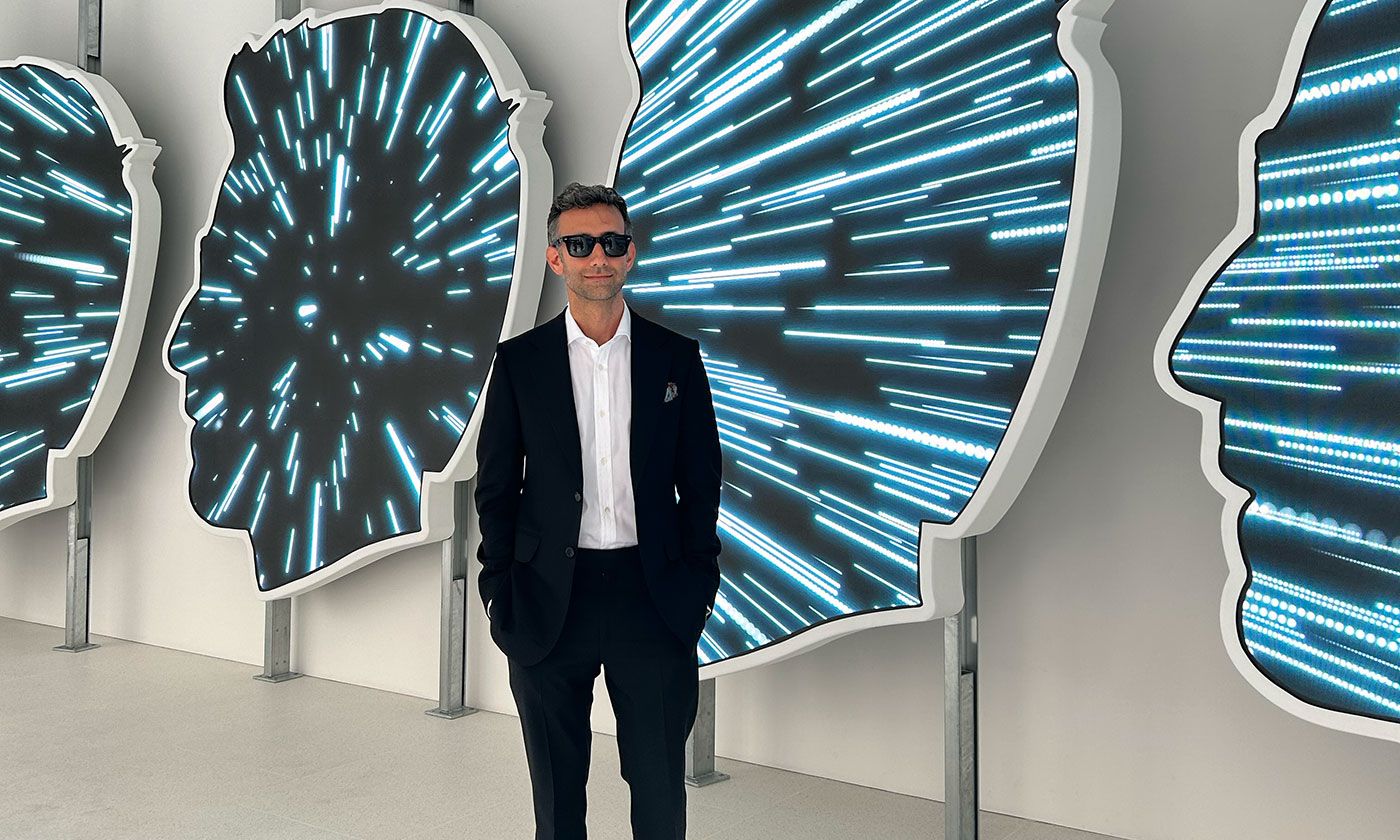Alex Israel at Gagosian, Davies Street, in front of some of the seven screens—based on his profile-in-shades logo—on which REMEMBR projects videos generated using AI from user's smartphone camera rolls Photograph: The Art Newspaper
Alex Israel, the Los-Angeles based artist who has made a name with his lively, knowing, take on pop culture and with the deadpan questioning of Hollywood stars in his YouTube interview show As it Lays, has a hopeful message for artists working with artificial intelligence (AI).
Speaking to The Art Newspaper while at Gagosian's Davies Street gallery in London to present his interactive video installation REMEMBR—a piece that uses an AI-powered app to generate vivid highlight videos from visitors’ smartphone camera rolls—Israel says that AI can "help art evolve into its next phases of being”. One that can help artists produce emotionally resonant experiences. It is an emphasis on the power of AI as an artistic tool, working with a contained, limited data set (one camera roll in isolation), at a time when the presence of AI has been a headline-making part of daily life for the past 20 months, and when artists and art institutions face the challenge of how to work with the big tech companies that control the AI industry without sacrificing control of the scholarly and artistic data they own.
In the case of REMEMBR, the artistic phase is in the app processing a user’s camera roll—in a matter of minutes—before outputting a 120-second categorised and thematic video (the AI is designed to filter out sensitive imagery and retains none of the data it analyses). The video outputs have animated interludes and a fizzing music layer, created by the shooting-star producer Blake Slatkin (a double Grammy winner in 2023 for co-producing and co-writing two global hits—Lizzo’s About Damn Time and Sam Smith and Kim Petras’s Unholy). It is an experience, Israel says, that he wanted to feel “very pop, very much like the types of shorter content formats that I used to watch growing up, like music videos or short cartoons”. But one with “an entertaining pop upbeat optimistic quality” one that sounds “like now, this moment in time”.
The installation is presented across seven screens—each the shape of Israel’s trademark profile-in-shades logo—with Slatkin’s music generating a meditative sound when the thematically grouped images are static (food, documents or architecture) and upbeat and contemporary when the app collates pictures of people partying.
Israel got the idea for REMEMBR from the randomised and potentially emotional power of the Memories facility on Apple iPhones that generates highlights around images grouped by events, days or visual themes. (Apple showed its intent to up its AI game this week with the launch of Apple Intelligence, built in partnership with OpenAI, the makers of ChatGPT, the market-leading chatbot that launch the consumer age of AI following its launch in November 2022.)
With the REMEMBR project—launched at Art Basel in Miami Beach 2023 and shown at Art Basel Hong Kong 2024, on both occasions in a collaboration with the car-maker BMW—he wanted to make that experience both more public and more profound; to create an emotionally resonant experience. “How can I use AI to help me edit through this [smartphone] journal that I've been making of my life that's now 100,000 pieces of content that I can't imagine having to scroll through?”
"We're going to be forced to think of new ways to create and be creative": Alex Israel at Gagosian's Davies Street gallery in London Photograph: The Art Newspaper
“Maybe I could find some way of building on those little memories. but making them more intense, bigger, getting more content into them.” He wanted to produce something even more finished, edited and deliberate than the iPhone Memories experience. What, he wondered “if it happened in a room with other people and you're potentially going to share that moment? How would that amplify the experience of looking at your life?”
Israel used his network—he was connected to Slatkin on Instagram—his experience in the film industry, and contacts made at tech conferences to pull together a team to build the AI, the animations and the music, and engineer the whole into the installation app.
“We've had such an amazing run on the last cycle of how technology changed art,” Israel says of the internet. “It allowed us to see so much and enter and refer back to so many things, so quickly and so easily on our computers. and it really encouraged this way of thinking about art and making art [by] collecting references and combining them and remixing them together.” But AI, he says “is going to collect and remix and reference all of these things so much faster than humans can … we're going to be forced to think of new ways to create and be creative”.
“And my hope is that, the currency of creativity … will be refocused on inventing new things, new forms, exciting things that we don't even know about yet. I mean, if AI can make a beautiful image, based on mimicry of all these other images, maybe what we'll have to do is find ways to make things that aren't beautiful again.”
Israel hopes, he says, that visitors to the installation will “have a great moment of reflection; some of the things that they've experienced in their life that they are reminded of; something that they may have forgotten or hadn't thought about in a little bit”. Interacting with REMEMBR is designed to be ephemeral; an event. It is, Israel says, “another moment in time, another memory, just like all the others”.

